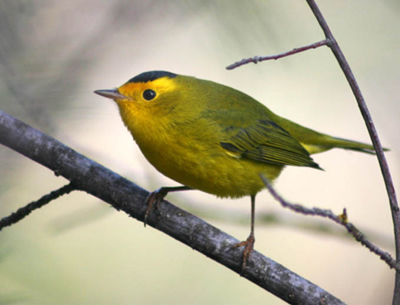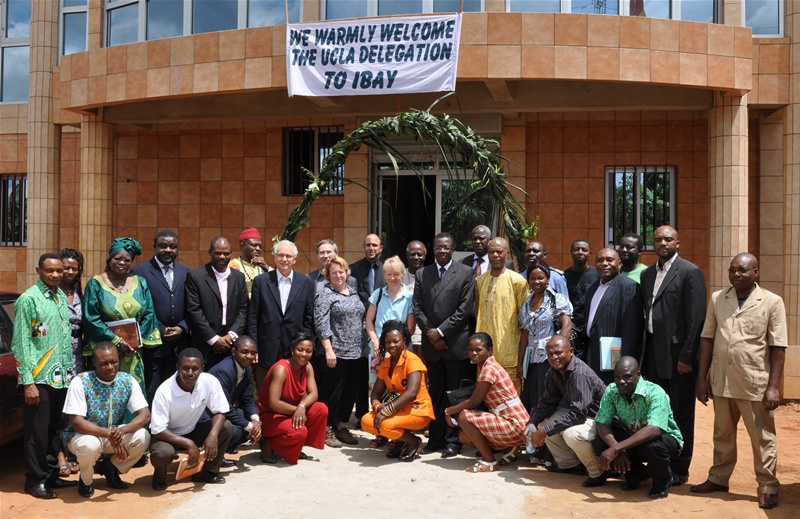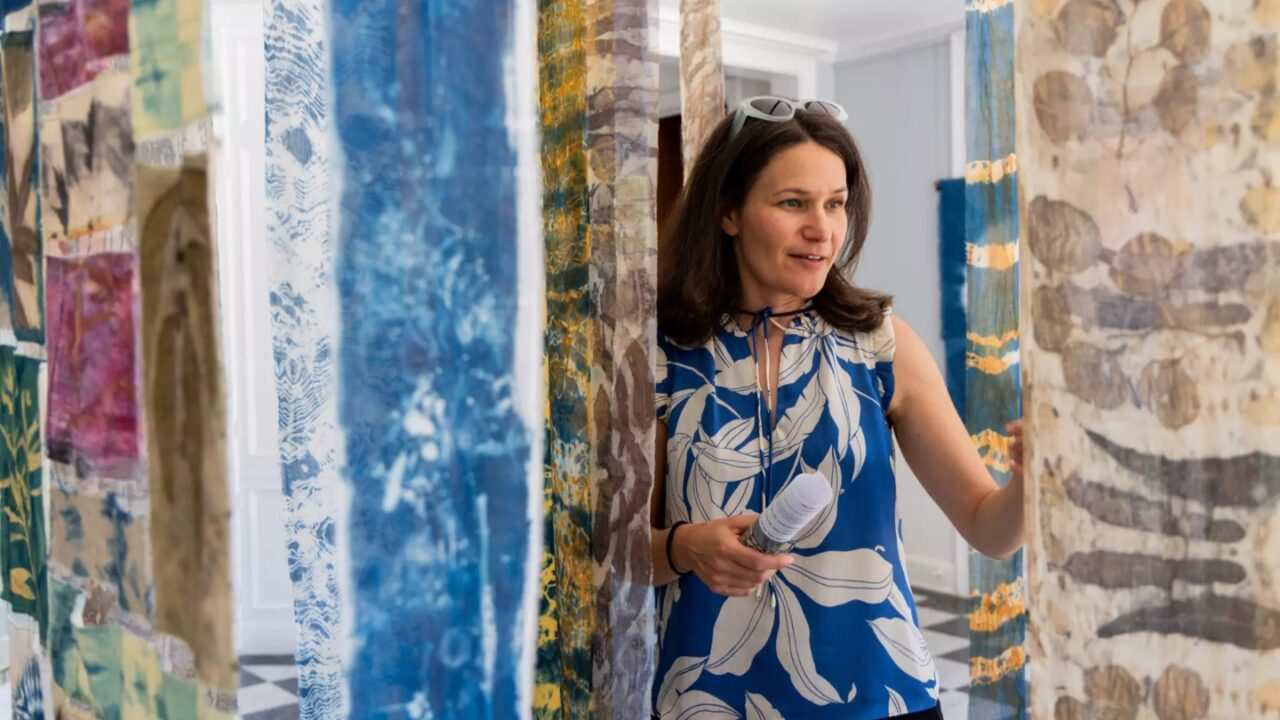
Center for Tropical Research November 2011 Newsletter
CTR researchers report on a study tracking migratory songbirds and field research on seed dispersal of a tropical tree in Ecuador
Letter from the Director
Dear Friends,
Progress in building the International Research and Training Center (IRTC) in Cameroon continues at a rapid pace. UCLA graduate Kaitlin Kelly-Reif recently took over the reins as the facility manager in Yaoundé, and she is trying to keep up with the mushrooming requests from researchers around the globe. If our social media scoreboard is any indication, the IRTC has definitely taken off. As of this week, Facebook shows the IRTC now has 1,452 monthly active users and 413 people liking it. The recent group of visiting researchers, with studies focusing on topics ranging from art history to termites, highlights the diversity of the research projects the center is facilitating.
In September, a delegation from UCLA and the University of Oregon visited Cameroon to explore opportunities for exchanges. Members included Hilary Godwin, Professor, Department of Environmental Health Sciences, School of Public Health, and Institute of the Environment and Sustainability, and Faculty Director of UCLA’s Global Bio Lab, Gregory Szekeres, Deputy Director, UCLA Program in Global Health, David Geffen School of Medicine, Geraldine Richmond, Richard M. and Patricia H. Noyes Professor in the Department of Chemistry, University of Oregon, John Pollinger, CTR Associate Director, Kevin Njabo, CTR Africa Director, and myself. The whirlwind tour and meetings with faculty and students at the University of Yaoundé and University of Buea, and with researchers at various other institutions and organizations, was a huge success.
An immediate outcome of the trip is a plan to send students from UCLA’s School of Public Health and David Geffen School of Medicine to Cameroon this upcoming academic year on research projects. Two highlights of the trip were the signing of a collaborative agreement between CTR and the International Bilingual Academy of Yaoundé (IBAY, directed by Dr. Zac Tchoundjeu, Regional Coodinator of the World Agroforestry Research Centre), and the launching of the Cameroon chapter of COACh International (iCOACh)by Drs. Richmond and Godwin. The Committee on the Advancement of Women Chemists (COACh) is a grassroots organization that has trained thousands of women faculty, graduate students, and postdoctoral researchers. The organization leads workshops on effective leadership, negotiation, and communication skills useful to women scientists in all countries, but especially in developing ones such as Cameroon.
I hope you enjoy this Fall’s CTR Newsletter.
Sincere regards,
Thomas B. Smith, Ph.D.

Feature Article
Connecting the Wintering and Breeding Sites of Migratory Songbirds Using New Isotopic and Genetic Methods
by Kristen Ruegg, Ph.D., Research Associate, University of California, Santa Cruz and Senior Research Fellow, Center for Tropical Research, Institute of the Environment and Sustainability, UCLA
Field Report
The Ecological and Genetic Role of Seed Dispersal for a Tropical Tree in Ecuador
by Stephanie Steele, Graduate Student, Ecology and Evolutionary Biology and Center for Tropical Research, Institute of the Environment and Sustainability, UCLA
Updates
CTR Graduate Student Receives Ph.D.
Allison Alvarado received her Ph.D. from the UCLA Department of Ecology and Evolutionary Biology in Spring 2011. Her thesis was on “Evolutionary dynamics across a migratory divide: Testing the causes and consequences of divergence in hermit thrushes (Catharus guttatus).
CTR Launches New California Climate Change Project
CTR has recently partnered with the National Park Service Santa Monica Mountains National Recreation Area and the Ventura branch of the United States Fish and Wildlife Service to investigate how climate change will impact the biological diversity within southern California protected areas. This work is being conducted under the recently organized California Landscape Conservation Cooperative (CA LCC), a management-science partnership that seeks to better link quality science with sound policy and management decisions. For more information on this and other projects by the CA LCC, go to: http://californialcc.org. CTR Postdoctoral Scholar Ryan Harrigan and Katy Semple Delaney, National Park Service Ecologist, Santa Monica Mountains National Recreation Area, are coordinating this project.
CTR Affiliate Leaves UCLA for New Position
Ali Hamilton, a former postdoctoral scholar in the laboratory of Paul Barber, began a postdoctoral fellowship at the Smithsonian Institution National Museum of Natural
Field Research Trips
Tony Chasar traveled to Cameroon in August and September of 2011 to conduct fieldwork on a project to track long-distance movements of hornbills near the Dja Faunal Reserve. He was assisted by Francis Alemanji Forzi, a Cameroonian member of the CTR research team. The trip focused on capturing White-thighed and Black-casqued hornbills in order to attach Global Positioning System (GPS) satellite tracking units. Aerial mist nets were used high up in the forest canopy in an attempt to capture these elusive birds. During this time, one White-thighed hornbill was captured and a satellite tracking unit was attached to the bird. In addition, as part of CTR’s avian influenza surveillance project, they surveyed one site in the Central Region near the Douala-Edea Faunal Reserve and were able to capture and sample 84 wild birds for avian influenza.
Emily Curd conducted field research at the Sedgwick Reserve in Santa Ynez, California in May and June of 2011. The 5,896-acre reserve is part of the University of California Natural Reserve System and is administered through the University of California, Santa Barbara. Emily collected soil samples for her dissertation project that examines the relationship between microbial community structure and enzyme activity in organic carbon storage in soils. The reserve is particularly well-suited to her study because it contains soils that are relatively homogenous and supports vegetation types with very different soil carbon contributions, including grassland, coastal sage scrub, and oak woodland.
Kaitlin Kelly-Reif, who received her Bachelor of Science degree in Environmental Science at UCLA in 2010, traveled to Cameroon in September 2011 to serve as the Facility Manager for the IRTC through June 2012. Since her arrival two months ago, more than twenty researchers from the U.S., England, China, France, and the Czech Republic have stayed at the facility, including a Fulbright scholar, veterinary students, ornithologists, and the president of Global Green Carbon. In early October, she helped CTR Director Tom Smith organize a tour for a delegation from UCLA and the University of Oregon. In addition to her duties as IRTC manager, Kaitlin teaches Environmental Science to secondary students at the International Bilingual Academy of Yaoundé, a partner organization of the IRTC that is developing a bachelor’s program in sustainable agroforestry. She is also collaborating with epidemiologists at Centre Pasteur and will begin fieldwork in January 2012 investigating the environmental risk factors of the Buruli ulcer, a tropical disease caused by Mycobacterium ulcerans infection. Currently, Kaitlin is working on developing a laboratory space and a workshop center within the IRTC facility, in preparation for National Institutes of Health-Fogarty International Center workshops that will be hosted at the IRTC in March 2012. The IRTC recently launched its newly-designed website at www.irtc.ucla.edu.
Brenda Larison travelled to Nairobi, Kenya, for two weeks in June 2011 as part of her investigation of the population genetics of the endangered Grevy’s zebra. She conducted testing of samples in the lab of Dr. Elijah Githui, at the National Museum of Kenya, and at the International Livestock Research Institute, along with Dennis Odhiambo, a student who is working on the project as part of his master’s degree studies at the University of Nairobi. From late September through October, she returned to the field to collect samples for her project investigating the underlying genetic origins of zebra stripe variation. She spent four weeks in the Western Cape of South Africa collecting samples and one week in Etosha National Park. In South Africa, she was assisted by the Quagga Project as well as local assistants Ross Cowlin, a graduate of the University of Cape Town, and Anzio Abels, a graduate of the University of the Western Cape. Hanna Linstadt, a recent UCLA graduate, joined her in both South Africa and Etosha. She was also joined in Etosha by Ilonka von Lippke, a CTR Senior Research Fellow, and her daughter Olivia, a budding biologist.
Claire Loiseau and Ravinder Sehgal, CTR affiliates from San Francisco State University, traveled to Alaska in June and July of 2011. Claire’s research focuses on how global climate change will affect the transmission of malaria in birds. The team collected mosquitoes and blood samples from many species of birds, both residents and migrants. They began in Anchorage and continued north, past the Arctic Circle, to Coldfoot. Claire’s results show that avian malaria is transmitted locally in Alaska, but not north of 64°N. With increasing temperatures in Alaska, the concern is that malaria will spread northward, and affect sensitive bird populations. They are also working with the Alaska Bird Observatory, the U.S. Geological Survey, and with CTR postdoctoral scholar Ryan Harrigan. The work will form the basis for a long-term study to determine how climate change will affect disease transmission in the Arctic.
Claire Loiseau travelled to Cameroon in early November 2011 as part of the field crew for CTR’s avian influenza project, working with CTR Africa Director Kevin Njabo in Dschang, in the West of Cameroon, to collect samples from wild birds and domestic poultry. This study is part of a multi-country collaborative effort funded by the National Institutes of Health-Fogarty International Center to examine spillover and transmission of avian influenza between wild birds, domestic poultry, swine, and humans. Later in November, she and Francis Alemanji Forzi will visit another sampling site in Mbalmayo, south of Yaoundé. In December, Claire, Francis, and Tony Chasar will travel to the Central African Republic where they will be sampling in Bayanga, the administrative seat of the Reserve of Dzanga Sangha, and in small villages in the vicinity of Bayanga. In the Bayanga region, the population greatly increased in the 1970s, which resulted in an increase in the numbers of domestic poultry. This development has increased the potential for interactions between wild birds and poultry, thus increasing the possibility of transmission of influenza. As a result, CTR is expanding its geographic monitoring program of H5N1 influenza surveillance to new countries of the Congo Basin such as the Central African Republic.
Hilton Oyamaguchi returned to Brazil in October 2011 for four months of fieldwork to complete his dissertation research. He is testing the heritability of variations in frog populations along the gradient between the Amazon rainforest and the Cerrado (tropical savanna). He received two significant donations for his field studies from Susan and Dan Gottlieb, owners of the G2 Art Gallery in Venice Beach, California.
Raul Sedano travelled to Colombia and Peru in November 2011. He will attend a meeting in Peru and spend a month in the field in Colombia as part of his dissertation research focused on studying evolutionary processes in Neotropical birds in the Northern Andes.
Marisa Tellez traveled to Florida and Louisiana in the summer of 2011 to analyze how environmental and anthropogenic impacts are effecting parasitism in the American Alligator. An interesting finding was that Florida alligators had no intestinal parasites compared to Louisiana alligators. In addition, the amount of parasites and the species of parasites in Louisiana alligators appear to be significantly different than what was found during the previous two years. Tissue samples of alligators and parasites will be analyzed for heavy metal correlation to the alteration of parasitism.
Awards, Presentations, and Appointments
Janice Chan, an undergraduate student working with CTR postdoctoral scholars Trevon Fuller and Henri Thomassen, received the 2011 Undergraduate Research Award from the UCLA Department of Ecology and Evolutionary Biology. Janice carried out research in bioinformatics on a volunteer basis at CTR for three years. Her work on computational aspects of conservation biology contributed to a manuscript entitled “Mapping evolutionary process: a multi-taxa approach to conservation prioritization,” that was published in Evolutionary Applications. She was also responsible for the computational analysis for a research project that used Geographic Information Systems (GIS), remote sensing, and optimization to design an optimal set of “reserves” for Ecuador, which is a global hotspot of biodiversity. Janice is currently a graduate student in the Department of Organismic and Evolutionary Biology at Harvard University.
Trevon Fuller attended a symposium entitled “Animal Migration,” sponsored by the Royal Swedish Academy of Sciences and the Wenner-Gren Foundations at the Sven Lovén Centre for Marine Sciences, from June 8-11, 2011 in Fiskebäckskil, Sweden. Trevon gave a presentation entitled “Combining molecular genetic and isotopic markers to elucidate patterns of migratory connectivity and disease transmission.” The symposium was attended by 62 biologists from ten countries who study animal movement.
Rachel Johnston received a Research Award from the UCLA Department of Ecology and Evolutionary Biology in June 2011. She used the award to perform next generation sequencing to study genes expressed during migration in Swainson’s thrushes.
Kevin Njabo was an invited speaker at the Cameroon Professional Society (CPS) 2011 Distinguished Annual Congress on Cameroon: Collective Efforts Towards Sustainable Development, held July 29-31, 2011, in Gaithersburg, Maryland. He participated in a panel on “Sustainable Agriculture and Rural Development in Cameroon.” He also gave a presentation at the International Meeting on Malaria and Related Haemosporidian Parasites of Wildlife, held August 5-7, 2011, in West Virginia, sponsored by the National Science Foundation Research Coordination Network for Haemosporida of Terrestrial Vertebrates. He spoke on “Feeding habits of Cameroon lowland forest mosquitoes based on stable isotopes and blood meal analyses.” Kevin was also the lead author of a paper on the discovery of H1N1 flu virus in swine in Cameroon published in Veterinary Microbiology, entitled “Pandemic A/H1N1/2009 influenza virus in swine, Cameroon, 2010.” The UCLA news release about the study was published in more than 24 online media outlets across the country in September 2011.
Hilton Oyamaguchi was awarded a Dissertation Year Fellowship in May 2011 from the UCLA Department of Ecology and Evolutionary Biology to complete his study of the role that ecotones play in speciation and divergence in frogs in the transition zone between the Cerrado and the Amazon rainforest in Brazil.
Raul Sedano received a travel award from the Neotropical Ornithological Society to give a presentation at the IX Neotropical Ornithology Congress and VIII Peruvian Ornithology Congress in Cusco, Peru, held from November 8-14, 2011. He will give a presentation on “The evolution of body size in tanagers and their allies, and the role of altitudinal gradients in the tropical Andes,” a part of his dissertation research.
Marisa Tellez attended the 86th Annual Meeting of the American Society of Parasitologists, held June 1-4, 2011 in Anchorage, Alaska, and presented a talk on part of her dissertation project, entitled “Anthropogenic and environmental effects on helminth parasitism in the American Alligator, Alligator mississippiensis.” She also presented this project at the American Society of Ichthyologists and Herpetologists (ASIH) in Minnesota in July 2011. Marisa presented a poster on a side project, entitled, “Acanthocephalan parasitism of the Southwestern Speckled Rattlesnake, Crotalus mitchellii pyrrhus” at ASIH, and at the Biology of the Rattlesnake Symposium in Tucson, Arizona at the end of July.
Grants
- UCLA Academic Senate Council on Research Faculty Grants Program
Using Next Generation Genetic Sequencing to Link the Breeding, Wintering, and Migration Areas of North American Songbirds. (2011-2012)
- California Landscape Conservation Cooperative (CA LCC)
Maximizing Evolutionary Potential under Climate Change in Southern California Protected Areas. (2011-2013)
Donors
CTR would like to thank Susan and Dan Gottlieb, owners of the G2 Gallery in Venice California, for their donations to Hilton Oyamaguchi’s field research in Brazil. We would also like to thank Lee Cooper for his contribution to the International Research and Training Center in Cameroon.



